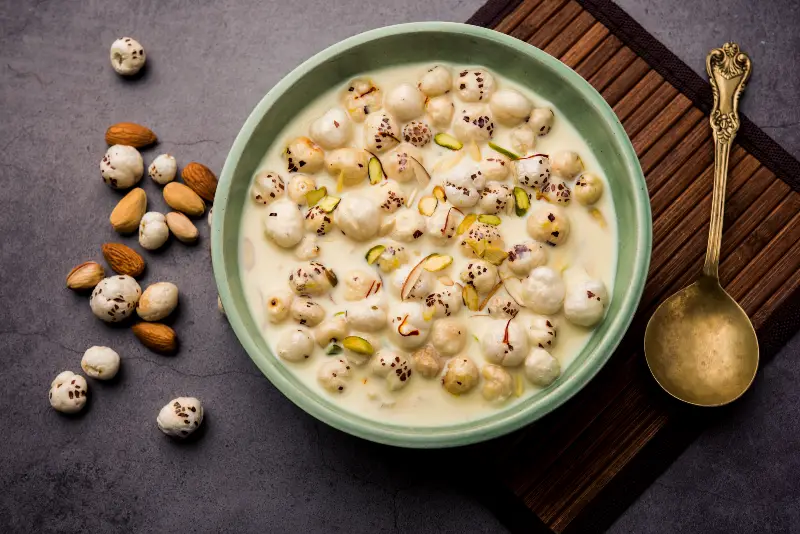Last updated on August 1st, 2022
Makhana is also popular as lotus seeds or fox nuts. Makhana originates from a plant named Euryale Fox. The plant cultivates in standing water or ponds in Eastern parts of Asia. Fox nuts grow on the leaf of the Euryale fox. In India, people make use of makhana in various religious ceremonies, also in fasting dishes. Moreover, people also use it for managing their cholesterol levels, and Makhana is good for diabetes.
Makhanas have gained immense popularity among the diabetic community. As they have a low Glycemic Index value and fewer calories as well. Around 50 g of dry-roasted makhanas( also known as talmakhana) contains nearly 180 calories. It is completely free from sodium or saturated fat content. Dry-roast makhanas mean not using grease or oil while roasting them.
Makhanas are popular snack items as they are rich in good carbohydrates and proteins. The GI value of makhana is considerably lower in comparison to foods such as pasta, rice, white bread, etc. Furthermore, the high magnesium and low sodium content make makhanas useful for people with high blood sugars and obesity.

What is Makhana?
A makhana is a dried form of lotus seed. Its production requires too much time and labor. The collection of its seed is the most difficult part. After collection, washing of makhana seeds is done and next is their drying in the sun.
Post-drying, roasting of makhanas is done on a dry pan at a high flame. People break the black shells resulting in the discharge of the white puff. Production of only one-third of makhana is via the whole collection process. Now, let’s see is makhana good for diabetes?

Makhana Nutritional Value
Makhana is an exceptional source of vital nutrients. And, this makes it a great inclusion of a healthy, well-balanced diet. This superfood contains rich amounts of proteins and fiber and minimal fat. Now, the question may arise,
How Many Calories are in Makhana?
Around 100 g of makhana provides nearly 347 calories of energy.
Moreover, there is 9.7 g of protein in makhana and 14.5 g of fiber. Also, there is an outstanding source of calcium. In addition, makhanas contain minerals like potassium, phosphorus, and magnesium in a good quantity. Also, there are some vitamins in fewer amounts in makhana.
Magnesium is helpful for normal metabolism. Its functions range from nerve function to muscle function, and even the formation of proteins. Additionally, makhana contains plenty of carbohydrates along with other minerals such as calcium and iron. Calcium is useful for promoting bone health. Also, it helps to lower the levels of blood pressure and makhana is good for diabetes.
Summary
The nutritional value of fox nuts is immense. Makhana has protein and fiber. Also, it consists of micronutrients such as iron, calcium, phosphorous, and magnesium.
Glycemic Index of Makhana
Fox nuts or makhana fall in low GI food groups. Makhana’s glycemic index is under 55, which is lower than other carb foods such as rice, bread, etc. Chiefly low GI makhana won’t increase the blood glucose levels swiftly. Therefore, there won’t be an immediate insulin spike.
Thus, it might reduce the possibility of developing diabetes, and makhana is good for diabetes.
Read More: Glycemic Index of Rice and Its Effect on Diabetic Person
Makhana for Diabetes
In diabetes, insulin either becomes absent or resistant. Type 2 diabetes occurs when insulin becomes resistant and occurs more commonly. The most difficult task in relation to diabetes is its management. Diabetes management involves a controlled diet, physical activity, and medicines, but we are offering the most reliable Online Diabetes Reversal Program in the market where we will help you to reverse your diabetes completely in just 6 months.
The diabetic diet involves food items having a low GI value. People may manage their breakfast, lunch, or dinner options by some means. However, they are not able to opt for a perfect snack. Here, makhana is an ideal snack alternative for diabetics. Its high carbs, high proteins, and low calories make it ideal in nature.
Is Makhana Good for Diabetes?
Few studies also support that makhana contains high amounts of fiber, proteins, and carbs. These nutrients are found to maintain normal blood sugar levels. As a result, it is possible to prevent insulin spikes and reduced glucose tolerance.
Also, research indicates that magnesium consumption may aid diabetic patients significantly. As people with diabetes are more prone to develop heart problems. Magnesium here lowers this risk considerably. In addition, makhana contains low sodium and high magnesium. Both of them help to improve obesity.
Side Effects of Makhana for Diabetics
Even though makhana exclusively manages diabetes, it comes with a few dark sides as well. The most common side effect of diabetes is hypoglycemia or low blood glucose. Makhana may lead to the delayed release of sugar in the bloodstream. Thus, there won’t be any insulin spike. Consequently, blood sugars would dropdown.
Summary
People who are using insulin and makhana both regularly are the targets. They might unpleasantly have an impact on blood glucose. And, hypoglycemia may take place.
Makhana Benefits and Uses
People might get astonished after reading about these versatile benefits of makhana. Some of the benefits are stated below:
Packs antioxidants
Makhana contains several antioxidants. These are compounds assisting in stabilizing damaging free radicals, thus avoiding oxidative stress. Particularly, makhana comprises antioxidants such as epicatechin, gallic acid, chlorogenic acid, etc.
Studies state that antioxidants are useful in numerous aspects of health. Also, they are seen to defend against chronic health problems such as T2DM, heart problems, and cancer. Moreover, antioxidants decrease inflammation. And, this might be helpful for inflammatory conditions such as gout, rheumatoid arthritis, IBD, and psoriasis.
Summary
Makhana is a rich source of antioxidants, which are known to guard against inflammation and chronic medical problems.
Stabilizes Blood Glucose Levels
Studies propose that makhana may aid in promoting better blood glucose control. For instance, one animal study indicated that administration of a makhana extract supplement to diabetic rats assisted in better blood glucose control. Also, it enhanced numerous antioxidant enzymes.
There was another animal study that supported an improvement in insulin and blood glucose levels in diabetic rats when a particular compound taken from lotus seeds was given. There were other animal studies also that found comparable findings. This noted that makhana extract may prove well in improving blood glucose control.
Summary
Numerous studies indicate that makhana extract is useful for improving blood glucose control. So we can say that makhana is good for diabetes.
Makhana(Lotus Seeds) for Weight Loss
Including lotus seeds in a person’s diet is a perfect way of boosting protein and fiber intake. Both of them are fundamental nutrients for weight management. Particularly, protein has been found to lower food cravings. Also, it may improve appetite as well.
Does Makhana Increases Weight?
Fiber moves gradually via the gut to keep a person full throughout the day. However, a few studies indicate that intake of a higher quantity of fiber might associate with decreased belly fat and improved weight loss. Yet, additional studies help to assess the makhana effects on weight management.
Summary
Makhana contains rich amounts of protein and fiber. Both are useful in weight loss and fat loss.
Makhana Comprises Powerful Anti-aging Properties
Few studies recommend that various compounds present in makhana might comprise strong anti-aging properties. Actually, makhana comprises numerous amino acids proven for their strong anti-aging properties. These amino acids are arginine, glutamine, methionine, cystine, etc.
Glutamine, for example, is helpful for producing an amino acid, proline. It occurs in collagen, a compound that promotes skin elasticity and hydration. Arginine and methionine help in the formation of creatine, another compound consisting of anti-aging effects. Also, makhana contains several antioxidants, which aid in supporting skin health and delaying aging symptoms.
Summary
Makhana is rich in antioxidants and comprises many amino acids. Both exert powerful anti-aging actions, like supporting better skin health.
Makhana(Fox Nuts) for Heart Patients
Even though studies in humans are short, a few animal studies observed that fox nuts might benefit heart health. An animal study observed that giving makhana extract to rats with non-alcoholic fatty liver disease for 4 weeks considerably decreased the levels of high cholesterol and triglycerides. Both of these are common risk factors for cardiovascular problems.
Another animal study found makhana extract improved the levels of cholesterol and triglyceride in diabetic rats. Besides, another animal study observed that makhana extract defended the heart against injury. Also, it assisted in stabilizing the damaging free radicals.
Yet, there is a need for more studies to determine how makhana has an impact on heart health in humans. And, whether diabetic patients can take makhanas safely for heart health or not.
Summary
A few animal studies observed that makhana extract might decrease the levels of cholesterol and triglycerides. This is useful for improving cardiac health.
How to Eat Makhana(Lotus Seeds)?
Makhana or lotus seeds were earlier not extensively available as other types of nuts and seeds. But now people may find makhanas at many specialty stores or online retailers as well. Makhanas come with a neutral, mild taste that works well in many recipes.
One of the most well-accepted ways of making makhana is by roasting the seeds. After that, people can season them using herbs or spices of choice. These may include black pepper, oregano, sea salt, chili, or turmeric powder.
Also, makhanas are a great inclusion to main courses, such as the or curries. These are dishes prepared using veggies, puffed rice, chutneys, or peanuts. Instead, people may try combining sliced and roasted fox nut seeds into kheer. This makes it a popular Indian Dessert for diabetic patients.
Summary
Makhana comes at many specialty stores and online retailers. People can roast them and enjoy makhanas as a savory snack. Also, makhanas are a great addition to entrées and desserts. Also, there are several benefits of eating makhana. Makhanas or fox nuts are rich sources of antioxidants and micronutrients. These are useful in slowing down the signs of aging. Also, makhana promotes better heart health, weight management, and blood glucose control. Moreover, makhanas are versatile and easy to enjoy in various recipes, like snacks, main courses, and desserts.
Read More: Check Normal Blood Sugar Level Chart for an Adult
FAQs:
Is it safe to have makhana at night?
Eating makhana at night is not a problem. Makhanas are a great snack for in between your meals or at midnight.
Can kidney patients eat makhana?
Kidney health depends upon a low sodium diet, less stress, and controlled blood pressure. Makhana provides all of these and aid in better kidney work. Also, makhana works to relieve a person’s body from problems like often urination, incapacity of controlling urine, or kidney failure
What is the best way to eat makhana?
The best way of eating makhanas is by roasting them in ghee and including spices and condiments of choice. These can be green chilies, garlic powder, coriander powder, mint leaves, curry leaves, turmeric powder, etc. People also include other nuts like cashews, almonds, or peanuts to include more crunch to this healthy item.
How much makhana in a day is safe for diabetics?
A diabetic patient may take nearly 30 g (2-3 handfuls) of makhanas on a daily basis. This would be helpful in controlling blood sugar levels and avoiding any spikes.
References:
References
- https://www.healthline.com/nutrition/makhana-benefits#How-to-enjoy-makhana
- https://www.beatdiabetesapp.in/is-makhana-bad-for-diabetes-benefits-and-side-effects/
- https://www.beatoapp.com/blog/benefits-of-makhana-for-diabetes-patients/
Last Updated on by Dr. Damanjit Duggal
Disclaimer
This site provides educational content; however, it is not a substitute for professional medical guidance. Readers should consult their healthcare professional for personalised guidance. We work hard to provide accurate and helpful information. Your well-being is important to us, and we value your feedback. To learn more, visit our editorial policy page for details on our content guidelines and the content creation process.

 English
English















